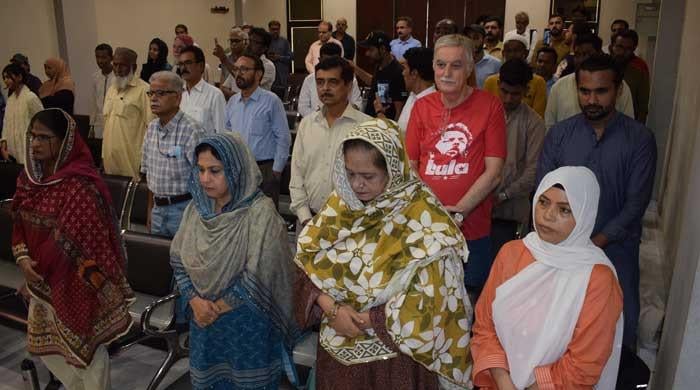PILER Seminar Highlights Minimum Wage Crisis in Pakistan on Labour Day
As workers across the globe commemorated International Labour Day, the Pakistan Institute of Labour Education and Research (PILER) convened a seminar on Wednesday, focusing on the critical challenge of minimum wage law enforcement in Pakistan.
The assembly at the Karachi Press Club united trade union representatives, government officials, and international labor advocates, all seeking viable strategies to safeguard worker entitlements amidst economic volatility. Abbas Haider, Joint Director of PILER, presided over the event, which honored the memory of Karamat Ali, the organization’s late founder, whose enduring dedication to labor rights continues to inspire PILER’s mission and the broader labor movement.
Against a backdrop of escalating inflation and currency depreciation that has diminished workers’ financial capacity, the seminar addressed the fundamental shortcomings that have left numerous Pakistani laborers without the essential wage safeguards mandated by legislation.
Employer Resistance and Insufficient Wages
Nasir Mansoor, a worker representative on the Sindh Minimum Wage Board, initiated discussions by underscoring the glaring inconsistencies in employer conduct. “We have observed the opposition presented by employers within the minimum wage board. They are willing to donate to charity but reluctant to provide their employees with equitable compensation,” Mansoor stated. He stressed that Pakistan’s existing minimum wage is progressively inadequate due to unchecked inflation and currency devaluation, leaving workers unable to secure basic necessities.
Mansoor also critiqued the division of worker solidarity along racial, ethnic, and individual allegiances, observing that “90 per cent of workers lack collective bargaining powers.” He advocated for a resurgence of labor-centric organization: “While you may cherish your racial or ethnic identity, you should remember that you are fundamentally workers.”
Experiences from the Front Lines
Bushra Arain of the Sindh Lady Health Workers Union recounted experiences of organizing contract workers in the face of intense opposition. “A pharaoh occupies every decision-making position,” she noted, describing the autocratic management practices encountered by workers. Arain elaborated on how her union’s cohesiveness enabled them to assert their entitlements, despite facing imprisonment and physical abuse during demonstrations.
Legal Loopholes and Evasion Tactics
Mirza Maqsood Ahmed from PILER elucidated the technical methods of minimum wage evasion, detailing how employers exploit legal ambiguities to curtail worker compensation. “Employers contend that social security and EOBI deductions should be included as part of wages,” he explained, adding that most employees are never formally registered with these institutions. Ahmed emphasized that the absence of suitable worker classification into skilled, semi-skilled, and unskilled categories further allows employers to maintain artificially depressed wages, while also reducing gratuity payments and other benefits.
Historical Context and Eroding Purchasing Power
Qamar-ul-Hasan, a veteran trade unionist, provided historical context to illustrate the substantial decline in purchasing power. “In 2001, 2.5 months of minimum wage could purchase 1 tola of gold. Presently, you need to work 8.5 months to buy the equivalent amount of gold,” he revealed. Hasan emphasized that the current official minimum wage of Rs. 37,000 is already insufficient; however, an estimated 99 per cent of Pakistan’s 800 million-strong workforce do not even receive this legally mandated minimum.
Government Acknowledgment and International Perspectives
In a remarkably candid moment, Athar Shah, Director General of Shop Establishment, conceded the state’s shortcomings in enforcement. “We are ashamed that, despite the existence of this law, we are unable to enforce the minimum wage,” Shah admitted. He mentioned that workers often prefer roles with overtime opportunities, as the minimum wage alone cannot adequately support their families.
The seminar incorporated an international viewpoint from Comrade Patrick of the Socialist Network in Brazil, who shared insights from his nation’s experiences under President Lula. Patrick explained how Brazil effectively raised the minimum wage and tied it directly to inflation, safeguarding workers’ purchasing power. “Currently, the minimum wage in Brazil stands at 265 dollars, with no tax on the minimum wage,” he stated, adding that “Pakistan’s situation is far worse than Brazil’s” regarding worker protections.
Patrick promoted the modernization of union strategies through “social trade unionism” – fostering broader partnerships between workers, consumers, and suppliers to enhance leverage against employers. “We must leverage emerging digital platforms to disseminate this narrative,” he advised, suggesting that social media could reach previously unorganized segments, such as domestic workers and delivery personnel.
Implementation Gaps and Emerging Challenges
Labor rights advocate Habibuddin Junaidi recognized the significant labor legislation enacted by the Pakistan Peoples Party government in Sindh following the 18th Amendment but underscored the persistent implementation deficit. He pointed out that security guards are among the most exploited workers, often working 12-hour shifts for as little as Rs. 14,000 per month.
The seminar concluded with Mehnaz Rehman’s observation that “the disparity between the wealthy and the impoverished is expanding, and the government is failing to address this gap.” She highlighted emerging labor sectors not accounted for in conventional frameworks and urged unity among workers and the middle class to confront escalating inequality.



Comments (0)
No comments yet. Be the first to comment!
Leave a Comment